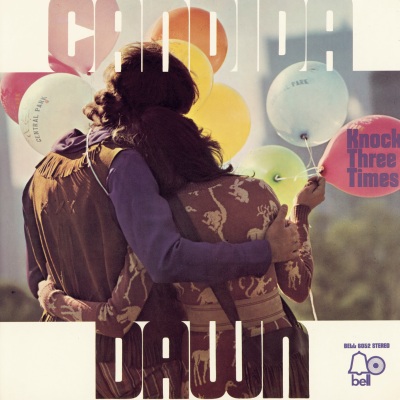
Candida
by Joe ViglioneWhat does the album Candida by Dawn have in common with Psycle by the Happenings? Both were produced by the team of Hank Medress, Phil Margo, Mitch Margo, and Jay Siegel -- collectively, the Tokens of "The Lion Sleeps Tonight" fame. The heavy-vocal Happenings were four clean-cut guys who hit in 1966-1967 while '70s star Tony Orlando was flanked by his long hair and two sweet-singing ladies. The title track, "Candida," was innocent enough pop for the time, neo-bubblegum fluff, as was its even bigger follow-up, "Knock Three Times," and a third hit from this album, songwriters White and Levine's rewrite of their own "Candida," "What Are You Doing Sunday." The odd thing was that two hit records not included on this LP came in between "Knock Three Times" and "What Are You Doing Sunday" on the charts. This debut by the soon-to-be-former manager of April Blackwood's publishing firm, Tony Orlando, was on the same label as the Partridge Family, Bell Records, and played to that same audience, with a big difference. The formula at play here is a combination of Ben E. King's sound and the music of Carole King. Decidedly unhip at the time, historically the album is far more important than ever given credit for. Carole King worked with Orlando on his first two hit records from 1961 and he returns the favor with a decent cover of "Up on the Roof," which was a smash for, gee, the Drifters and Carole King's friend, James Taylor. Two songs from James Taylor's 1968 Apple Records debut also show up here, "Rainy Day Man" and "Carolina in My Mind," so the sensibilities are definitely on the same curve as Carole King's Tapestry, Brill Building pop-meets-singer/songwriter, though here it is by way of a Vegas-style vocalist emulating the former lead singer of the Drifters. The Tokens contribute four original songs and co-producer Dave Appell pens one, giving this album the distinction of material by major figures from the 1960s and 1970s. Rock & rollers were definitely annoyed by Dawn's immense radio saturation with this syrupy sound crafted by producers Dave Appell and the Tokens, but there's no denying it struck a chord with a huge audience two months before the Partridge Family, and without the benefit of a hit TV show (that would come later). The non-descript cover reveals little, and none of the musicians are credited on the original vinyl pressing -- there's only a "thanks to Tony Orlando," no doubt because of his duties at the publishing company. The 12 songs are all pleasant on a recording that would be a classic if Orlando had put some of the soul of his hero into this mix -- and that's the paradox, for part of the formula was to replace Ben E. King's soul with a happy-go-lucky commercial glitz. Kind of like Pat Boone covering Little Richard, though not as blatant and certainly more respectful and fun.
